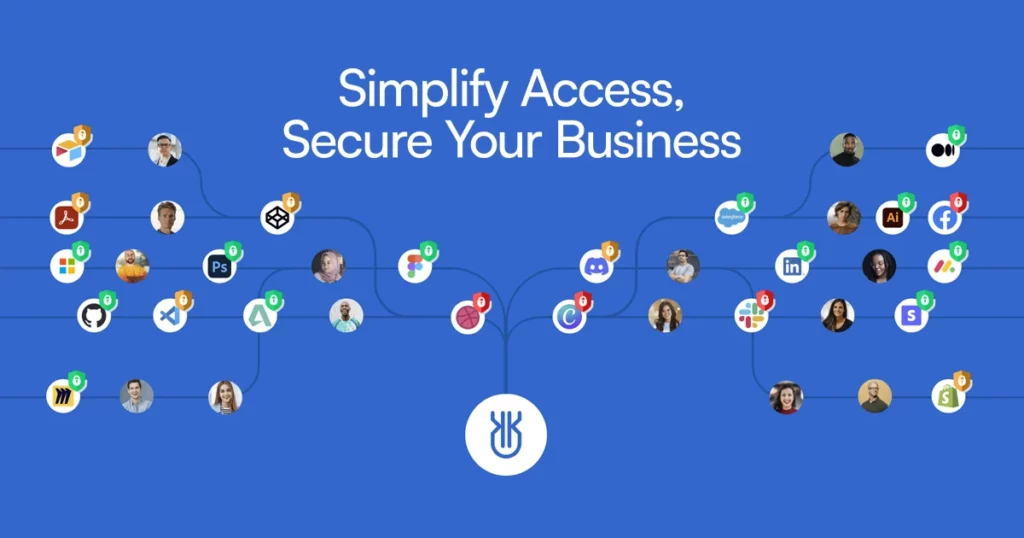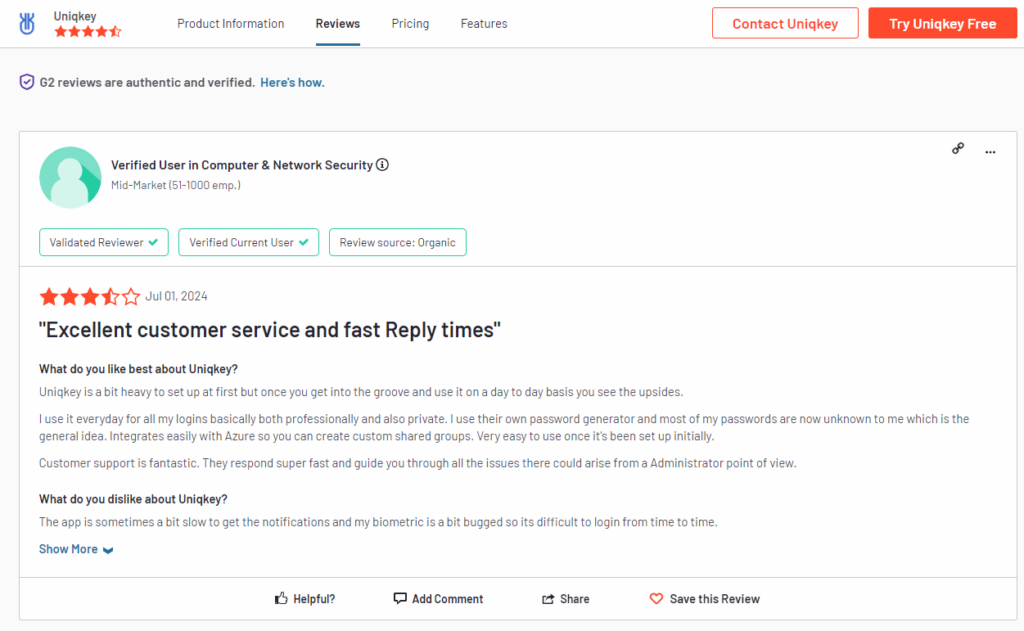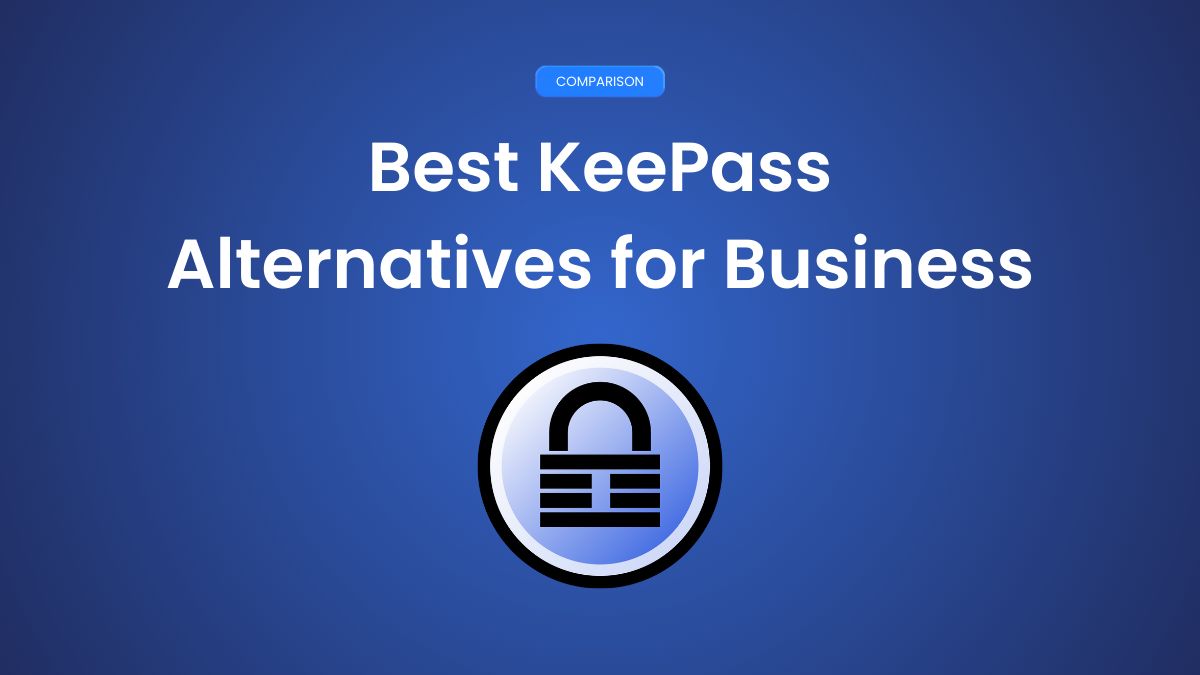Businesses juggle dozens of credentials for banking, CRM, cloud storage – the list goes on. Doing that securely across a team while adhering to strict European data privacy regulations is a tightrope walk. This is where password management comes in. Enterprise-grade password management involves much more than just storing and auto-filling logins and passwords – it is a vital pillar of a company’s security posture.
KeePass, a free-to-use, open-source password manager with certain plugin-based customisation options, offers a robust solution for individual users. However, some KeePass alternatives might suit security-conscious businesses with a distributed team and compliance concerns.
Table of contents
Disadvantages of Using KeePass Password Manager for Businesses
Despite being a prevalent open-source password management solution, KeePass may present some challenges to businesses seeking a centralised, user-friendly solution.
❌ No Default Multi-Device Sync
KeePass stores passwords in a local database, which is great for individual use. However, businesses need seamless access across devices, and multi-device sync with KeePass requires assistance from third-party plugins.
The problem with such plugins is that they are often unverified and may pose security threats. This lack of default, as well as secure multi-device synchronisation, can be a significant hurdle.
❌ Functionalities aren’t built into the platform
Plugins allow flexibility regarding the personalisation of the password manager but also pose additional risks. Daily activities like password-sharing and access management cannot be managed from a central control point. In that case, the password manager creates more problems than it solves, especially for teams with different privilege levels.
❌ No secure password sharing
KeePass does not have a built-in secure sharing solution. While there are workarounds, they negatively impact a company’s security posture and complicate adherence to the GDPR. Password-sharing is a basic need for enterprises, and any password management software that doesn’t offer it out of the box needs to be better suited.
Top 5 KeePass Alternatives Comparison Table
| Feature | KeePass | Uniqkey | Dashlane | NordPass | Bitwarden |
|---|---|---|---|---|---|
| Multi-Device Sync | No (Plugins available) | Yes | Yes | Yes | Yes |
| Secure Password Sharing | No (Workarounds exist) | Yes | Yes | Yes | Yes |
| Centralized Management | No | Yes | Yes | Yes | Yes |
| Automated employee Login | No | Yes | No | No | No |
| SSO Integration | No | No | Yes | Yes | No |
| Access Management | Limited | Advanced | Yes | Yes | Yes |
| Phishing Alerts | No | Manual | Yes | No | No |
| Shadow IT Monitoring | No | Yes | No | No | No |
| Policy Enforcement | No | Yes | Yes | Yes | Yes |
The Best KeePass Alternatives – Reviewed
Discover feature-rich password managers with advanced security & centralised control.
1. Uniqkey

Uniqkey is a Danish company founded in 2016. It specialises in enterprise-grade password management solutions. The company caters specifically to businesses and organisations seeking robust security and streamlined workflows. Uniqkey keeps all customer data in Europe which simplifies GDPR compliance for its clients.
Features that stand out
Uniqkey comes with the full set of features expected from a password manager, including a secure vault with permission-based access, a password generator, military-grade encryption, and even an option for offline data storage. The following features demand a special mention.
Automated employee login: A user trying to log into an account doesn’t need to open a separate app or copy-paste credentials. They just request access and approve the request from their phone. The platform takes care of even the multi-factor authentication.
Shadow IT Monitoring: This feature identifies unauthorised applications used within the organisation and helps the IT department integrate or discard such software.
Advanced Policy Enforcement: Uniqkey allows businesses to set strong password requirements and enforce security best practices among employees.
Centralised Management: Security admins can manage and monitor access and easily track access trails from a central dashboard.
Secure Password Sharing: Uniqkey facilitates secure password sharing within teams.
Zero-knowledge architecture: Uniqkey uses zero-knowledge proof to authenticate users, eliminating any possibility of customer data being compromised by a server hack.

What’s to like in Uniqkey
- User-friendly interface: Easy to learn and navigate, even for non-technical users.
- Ease of deployment: Streamlined setup process to get businesses up and running quickly.
- Robust security features: Uniqkey prioritises strong encryption. It uses a zero-knowledge architecture to safeguard user data in the unlikely event of a server hack.
- Scalability: The solution can adapt to the needs of growing organisations.
What’s to dislike
- No free plan: Uniqkey primarily focuses on paid plans for businesses.
Dependence on the phone: While users can forego phone-based authentication in certain situations, having the phone handy is crucial to Uniqkey’s identity verification model.
2. Dashlane
Founded in 2008, Dashlane is a French company catering to businesses and individuals. with a user-friendly interface and a host of enterprise-grade features, Dashlane is a fine alternative to KeePass.
Features that stand out
Password sharing: Dashlane enables users to share passwords and credentials with end-to-end encryption.
Phishing Alerts: Dashlane warns users about fraudulent attempts to steal login credentials, helping to prevent phishing attacks.
Single Sign-On (SSO) Integration: This allows users to log in to various applications with a single set of credentials.
What’s to like in Dashlane
- Strong security focus: Like Uniqkey, Dashlane uses zero-knowledge architecture to secure user data and offers robust access control.
- Praiseworthy customer support: Dashlane has often been applauded for its responsive user-support system.
- Cross-platform compatibility: The solution works seamlessly across various devices and operating systems.
What’s to dislike
- Limited advanced user management: Businesses with complex user permission needs might find Dashlane’s user management features somewhat limited.
- Some features might require a steeper learning curve: While generally user-friendly, some advanced features might require more time to learn and master.
3. NordPass
Established in 2014, NordPass is a Panama-based company known for its user-friendly password management tools and focus on data privacy. They cater to both individuals and businesses seeking a secure and convenient solution.
Features that stand out
NordPass prioritizes ease of use and strong security, offering features that simplify password management:
Intuitive Interface: NordPass boasts a clean and user-friendly interface, making it easy for anyone to learn and navigate.
Secure Password Sharing: NordPass comes with a handy password-sharing feature allowing users to share credentials with colleagues as well as family members.
Cross-Platform Compatibility: Access and manage your passwords seamlessly across various devices and operating systems with dedicated apps.
Data Breach Scanner: NordPass offers a data breach scanner that alerts you if your credentials have been compromised in a known data leak.
What’s to like in NordPass
- Affordable pricing: NordPass offers competitive pricing plans, making it an attractive option for individuals and businesses alike.
- Easy to use: The user-friendly interface makes learning and managing passwords a breeze, even for non-technical users.
- Wide range of features: NordPass offers a good balance of core functionalities and additional features like secure sharing and data breach scanning.
What’s to dislike?
- Limited advanced features: Businesses with highly specialised security needs might find NordPass’s feature set somewhat basic.
- Occasional customer support issues: A few reviewers mentioned experiencing delays in receiving responses from customer support.
4. Bitwarden
Bitwarden is a well-established password manager with a strong following. It offers both free and paid plans, catering to individuals and businesses seeking a secure and feature-rich solution.
Features that stand out
Bitwarden strikes a balance between robust features and open-source accessibility:
Open-Source Code: Bitwarden’s open-source nature allows independent security audits and fosters a transparent development process.
Secure Password Storage: Utilizes strong encryption to safeguard your passwords and sensitive data.
Cross-Platform Availability: Manage passwords seamlessly across various devices and operating systems with dedicated apps.
User Group Management: Businesses can manage user access and permissions with ease
What’s to like
- Free plan with core features: The free plan offers basic password management functionalities, making it a good entry point for individual users.
- Open-source approach: Users who value transparency and community-driven development appreciate Bitwarden’s open-source model.
- Feature-rich paid plans: Paid plans offer additional features like user group management, ideal for businesses seeking a centralized solution.
- Strong security practices: Bitwarden prioritizes user data security with robust encryption and access controls.
What’s to dislike?
- Less user-friendly interface (compared to some competitors): A few reviewers mentioned the interface might have a steeper learning curve compared to some competitors.
- Limited advanced security features (Free Plan): While paid plans offer robust security features, the free plan might lack some advanced options desired by security-conscious users.
5. 1Password
1Password is a Canadian company known for its robust password management solutions for individuals and businesses. They offer a comprehensive suite of features with a focus on user experience and security.
Features that stand out
Strong Security: 1Password prioritizes user data security with industry-standard encryption, multi-factor authentication, and a focus on security best practices.
Watchtower (Security Monitoring): This feature proactively monitors for compromised websites and password breaches, alerting users to potential security risks.
Travel Mode: This unique feature allows temporary removal of sensitive information from devices when traveling, adding an extra layer of security.
Cross-Platform Compatibility: Seamlessly access and manage passwords across various devices and operating systems with dedicated apps.
Family Plans: Share passwords securely with family members and manage access permissions within a single plan.
What’s to like:
- Comprehensive set of tools: This tool offers a wide range of features beyond basic password storage, catering to various user needs.
- User-friendly experience: The interface is clean and intuitive, making it easy for users of all technical backgrounds to learn and navigate.
- Family Plans: A valuable option for families seeking a secure and centralized way to manage passwords.
What’s to dislike
- Higher price point than competitors: 1Password’s pricing might be slightly higher than some alternatives.
- Slight learning curve for some advanced features: While generally user-friendly, some advanced features might require a bit more time to learn and master.
Choosing the best KeePass alternative for your business
Choosing the perfect password manager depends on your priorities. If your business prioritizes streamlining workflows, automating tasks, and enforcing strong security policies, a tool with administrative features like centralised access control and shadow IT monitoring can be a great pick.
🏆Uniqkey neatly ties security, ease of use, and user experience with features like 2FA auto-fill, Shadow IT monitoring, and centralised access control.
If you are looking for open-source tools, Bitwarden is a good option. In the end, the password manager should be able to scale with your business and make life easier for your employees.


